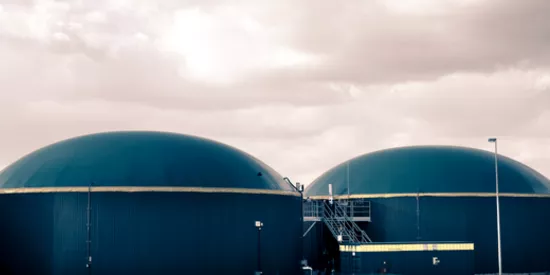
Powering Fuel Cell Expansion in the Northeast US
New projects using fuel cell technology that turn natural gas into electricity without combustion will help reduce carbon emissions while delivering reliable power in New Jersey and Connecticut.
As the energy transition continues to gain momentum, there is an increasing push to find more environmentally friendly ways to harness the power generated by fossil fuels. One promising technology that has the potential to replace traditional power generation is fuel cells, which can convert natural gas and other sources of power to electricity without the carbon impact of combustion. Fuel cells can reduce greenhouse gas emissions by 92% compared to average fossil-fuel dependent sources and 23% compared to the average U.S. marginal grid emissions, according to US EIA data.
A limited footprint technology
Despite being gas-fueled, fuel cells are becoming a necessary piece of the puzzle in supporting the energy transition, specifically in light of the growing energy demand required from data centers. Because fuel cells have a limited footprint (compared to solar or gas-fired power, for example) and their technology is modular, fuel cells provide an excellent way to secure baseload power to supply electricity to data centers.
Generate Capital, a sustainable infrastructure company, is working with Bloom Energy, an experienced manufacturer and operator of fuel cell projects with more than 1,000 megawatts of installed capacity, to install two new fuel cell server portfolios, one located in Connecticut and another in New Jersey. Combined they will have a capacity of 45 megawatts, wattage that will flow to large-scale facilities and consumers in the region.
The projects’ servers will use Bloom’s innovative Solid Oxide Fuel Cell (SOFC) technology, which produces negligible airborne emissions compared to combustion engines. SOFCs are manufactured in a fuel-flexible manner, which allows the cells to convert over time from using natural gas as a feed fuel to cleaner options such as renewable natural gas and hydrogen as reduced cost and increased availability make doing so viable. The ability for Bloom’s fuel cells to rely upon cleaner sources of power in the future offers the potential to further reduce the environmental impact of their energy production.
The potential to produce greener electricity at scale is the primary reason the SOFC market is poised to experience exponential growth over the next decade1, from $1.4 billion in 2023 to more than $21 billion in 2033.
Fuel cells are deployed in a variety of ways, but they are primarily used to support microgrids, which provide an independent, local power supply to hospitals, college campuses and businesses. Fuel cells can help decarbonize a variety of energy intensive activities, from reducing the emissions from maritime shipping to supplying a clean source of always-on energy to data centers and manufacturing facilities.
A total capacity of 45 megawatts
One of the new Bloom projects, a 20 megawatt large-scale in-front-of-the-meter asset, was recently placed in service. An in-front-of-the-meter assets is one situated on the utility side of the meter and uses its energy to supply an electrical grid to then be distributed to customers.
The other, a 25 megawatt behind-the-meter portfolio, is also expected to be placed in service in the coming weeks. A behind-the-meter asset is one that is located on the customer side of the meter and used for a manufacturing facility or data center’s own consumption, reducing its energy reliance on the grid and ensuring the reliability of its energy supply.
Societe Generale recently partnered with Generate Capital on their financing of the new fuel cell projects, having acted as Joint Lead Arranger and Hedge Provider in the non-recourse project financing for the assets.
Once completed, the new project will increase the total amount of Bloom Energy Servers owned by Generate to 147 megawatts, enough energy to power many tens of thousands of computer servers in a cleaner way.
“Supporting projects that leverage new technology to provide cleaner power on a large scale is the core of our business and what gets us up in the morning,” said Ahmed Maqsood, a banker on the Energy+ team at Societe Generale in New York. “Fuel cells represent an exciting new frontier in the energy transition and will play a significant role in decarbonizing energy intensive sectors.”
1 https://finance.yahoo.com/news/solid-oxide-fuel-cells-market-125000717.html




